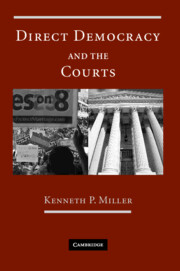Crossref Citations
This Book has been
cited by the following publications. This list is generated based on data provided by Crossref.
Douzet, Frédérick
and
Mac Donald, Karin
2010.
La représentation des minorités dans le système politique californien.
Pouvoirs,
Vol. n° 133,
Issue. 2,
p.
69.
Matsusaka, John G.
and
Hasen, Richard L.
2010.
Aggressive Enforcement of the Single Subject Rule.
SSRN Electronic Journal,
Burnett, Craig M.
Garrett, Elizabeth
and
McCubbins, Mathew D.
2010.
The Dilemma of Direct Democracy.
SSRN Electronic Journal,
Heußner, Hermann K.
2012.
Direct Democracy and Minorities.
p.
123.
Dyck, Joshua J.
2012.
Racial Threat, Direct Legislation, and Social Trust.
Political Research Quarterly,
Vol. 65,
Issue. 3,
p.
615.
Richards, Robert C.
and
Gastil, John
2012.
Legislation by Amateurs: The Role of Legal Details and Knowledge in Initiative Deliberation.
SSRN Electronic Journal,
Christmann, Anna
2012.
Direct Democracy and Minorities.
p.
47.
Tierney, Stephen
2013.
Using Electoral Law to Construct a Deliberative Referendum: Moving beyond the Democratic Paradox.
SSRN Electronic Journal,
2013.
The American State from the Civil War to the New Deal.
p.
113.
2013.
The American State from the Civil War to the New Deal.
p.
129.
Christmann, Anna
2013.
Anti-minority votes and judicial review.
Acta Politica,
Vol. 48,
Issue. 4,
p.
429.
Lewis, Daniel C.
Wood, Frederick S.
and
Jacobsmeier, Matthew L.
2014.
Public Opinion and Judicial Behavior in Direct Democracy Systems: Gay Rights in the American States.
State Politics & Policy Quarterly,
Vol. 14,
Issue. 4,
p.
367.
Ip, Eric C.
2014.
The High Court of the People: Popular Constitutionalism inHongKong underChinese Sovereignty.
Law & Policy,
Vol. 36,
Issue. 3,
p.
314.
Easterly, Bianca
2015.
Playing Politics with Sex Offender Laws: An Event History Analysis of the Initial Community Notification Laws across American States.
Policy Studies Journal,
Vol. 43,
Issue. 3,
p.
355.
Jourdain, Charlotte
Hug, Simon
and
Varone, Frédéric
2017.
Lobbying Across Venues: An Issue-Tracing Approach.
State Politics & Policy Quarterly,
Vol. 17,
Issue. 2,
p.
127.
Varone, Frédéric
Ingold, Karin
and
Jourdain, Charlotte
2017.
Defending the status quo across venues and coalitions: evidence from California interest groups.
Journal of Public Policy,
Vol. 37,
Issue. 1,
p.
1.
Varone, Frédéric
Gava, Roy
Jourdain, Charlotte
Eichenberger, Steven
and
Mach, André
2018.
Interest groups as multi-venue players.
Interest Groups & Advocacy,
Vol. 7,
Issue. 2,
p.
173.
Altman, David
2018.
Citizenship and Contemporary Direct Democracy.
Kost, Andreas
Solar, Marcel
and
Heußner, Hermann K.
2019.
Lexikon Direkte Demokratie in Deutschland.
p.
226.
McIntyre, Joe
2019.
The Judicial Function.
p.
3.





